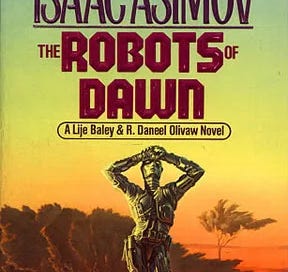The Caves of Steel trilogy (part of what’s known as the Robot series) by Isaac Asimov was one of my favorite works as a child. In fact, thanks to my mother, Isaac Asimov was one of my favorite authors; I say that even though I hated Foundation then, and still do now. I loved Galactic Empire, and the Black Widower stories, and The Gods Themselves. I believe my introduction to Asimov was my mother's copy of The Stars, Like Dust, a title which caught me at age nine with its beautiful punctuation.
I will tell you the three things that impressed me most about the Robot series, in which human and android detectives combine to solve murders while expounding to the reader sci-fi social tropes of consequence (oooh impressive). The first was the dark, warm, and hardly understood feels evoked in me by the romantic tension between Lije Bailey and Gladia in The Naked Sun; the second was the exploration of Earth public restroom etiquette in Caves of Steel (men never ever ever spoke to each other); and the third was the deleterious effect of the incredibly long lives of the Spacers on themselves individually and on their society.
Spacers, who were descended from the best Earth had to offer, and had departed purged of all disease, ruled every part of the galaxy they had explored. They did not permit the short-lived and disease-ridden Earth-dwellers to leave their planet and pollute the cosmos. They lived for 300 or more years, feared death, lacked initiative, moved slowly, and craved safety.
If you were to die now, you would lose perhaps forty years of your life, probably less. If I were to die, I would lose a hundred fifty years, probably more.
But Asimov was a minor star in the constellation of my childhood. The largest literary loom that loomed large in my childhood was The Lord of the Rings. In that tapestry, the immortal elves were doomed to leave the world to men. They were the first children, and lived forever, but knew that the second children, doomed to die, had a fate beyond death that brought them closer to the Creator (although that is only explicitly stated in The Silmarillion, which I read years later, rather than the trilogy). There is undoubtedly a bittersweetness to the elves' immortality, but that never robbed them of this: they blessed their world. The elves were crafters and gardeners and musicians and smiths and architects and poets. They made beauty appear everywhere they went.
I loved Lije Baley and R. Daneel Olivaw so much as a kid. I'm telling you, I read his adventures over and over again. But I knew, even as a child, what the difference between the worlds of Asimov and Tolkien were. There was no God in Asimov, and there was in Tolkien.
"If you were to die now," says Hans Fastolfe the Spacer to Lije Baley the Earther, "you would lose perhaps forty years of your life, probably less. If I were to die, I would lose a hundred fifty years, probably more." Spacers feared death, which was why the murder in their midst, which Bailey was to solve, was too terrifying for them to contemplate.
Meanwhile, from the Wars of Beleriand to the dawning of the Age of Men, the elves, a noble race but not without their moral failings, not only continued to make beautiful things, but to lay down their lives for their world and for Men.
What's the difference between elves and Spacers? I'll tell you.
Elves know where they go when they die. They go to Valinor in the West, to the halls of Mandos. In fact, they don't have to die to go there; they can sail there if they wish, though Men may not. The ones who stay love Creation, and will die for it, knowing what their blessed fate is.
Spacers simply cease to be when they die.
Of course, what’s best is to be a Man in Tolkien’s sense. Death is Ilúvatar’s Gift, and for that reason they, like us and the angels, are the envy of the elves. We go to be with the Creator.
C. S. Lewis feared that without the God of Christ we would become "men without chests". I believe we have become such men. But we’re not only chestless; there is another organ missing. We don't live to be 350 nor do we own 10,000 robots, but we do live to 90 and own 7 robots. That apparently is enough to undo us. We are afraid to die.
We are the men without balls.





I was more into Foundation than the Robot, and I 100% agree about Tolkien. I'm actually not sure if Asimov shaped my imagination at all. Tolkien most certainly did.
It was my father who first got me to read Asimov. (He taught astronomy, so naturally he was very familiar with his stories.)
As for the premise, I would guess that it’s not our fear that has become too great—just that something like our values, convictions or sense of meaning has become so small. Either way, the result is roughly the same.